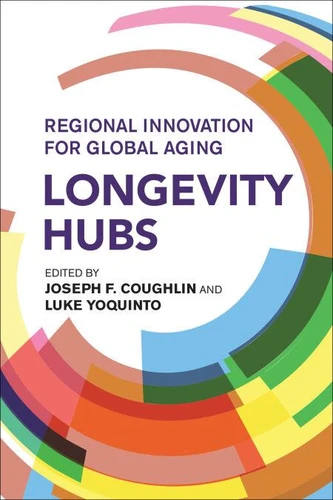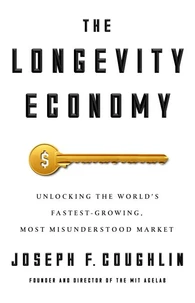Longevity Hubs. Regional Innovation for Global Aging
Par : ,Formats :
Disponible dans votre compte client Decitre ou Furet du Nord dès validation de votre commande. Le format ePub protégé est :
- Compatible avec une lecture sur My Vivlio (smartphone, tablette, ordinateur)
- Compatible avec une lecture sur liseuses Vivlio
- Pour les liseuses autres que Vivlio, vous devez utiliser le logiciel Adobe Digital Edition. Non compatible avec la lecture sur les liseuses Kindle, Remarkable et Sony
- Non compatible avec un achat hors France métropolitaine
 , qui est-ce ?
, qui est-ce ?Notre partenaire de plateforme de lecture numérique où vous retrouverez l'ensemble de vos ebooks gratuitement
Pour en savoir plus sur nos ebooks, consultez notre aide en ligne ici
- Nombre de pages370
- FormatePub
- ISBN978-0-262-37977-9
- EAN9780262379779
- Date de parution19/11/2024
- Protection num.Adobe DRM
- Taille901 Ko
- Infos supplémentairesepub
- ÉditeurThe MIT Press
Résumé
How innovation hotspots for the world's aging population may prove to be of vital economic and strategic importance in the years ahead. Populations around the world are aging, and older adults' economic influence-already considerable-stands to grow markedly in the decades ahead. Finding ways to make these lives better is a win-win-win: for older consumers; for aging economies; and for companies and the regions where they reside.
This much-needed volume edited by Joseph Coughlin and Luke Yoquinto, Longevity Hubs, brings together contributors-entrepreneurs, researchers, designers, public servants, and others-who are addressing the multifaceted concerns of aging societies. Together, they explore the possibility that specific regions will soon distinguish themselves as longevity hubs: a home to disproportionate economic and innovative activity for older populations.
If a region were to emerge as such a disproportionate hotspot, that area and its home nation might better weather some of the challenges posed by population aging, while at the same time providing a cash injection into the local economy thanks to aging markets domestic and foreign. Longevity Hubs explores strategies adopted by different areas' government and industry leaders to promote such activity; who different regions' target markets are; and how local, older adults may affect (and be affected by) innovation in their area.
Longevity Hubs opens on Greater Boston, with the collected articles comprising the "Longevity Hub" special project that ran in the Boston Globe in 2021 and 2022. Then the book zooms out to take in a more global stage, in the form of nine chapters written by representatives of cities and regions staking a claim as powerhouses of aging innovation. These include Louisville, in the US; Newcastle, in the UK; Dubai; Milan; São Paulo; Tel Aviv; regions in Japan and Thailand; and Aging2.0, a distributed network.
This much-needed volume edited by Joseph Coughlin and Luke Yoquinto, Longevity Hubs, brings together contributors-entrepreneurs, researchers, designers, public servants, and others-who are addressing the multifaceted concerns of aging societies. Together, they explore the possibility that specific regions will soon distinguish themselves as longevity hubs: a home to disproportionate economic and innovative activity for older populations.
If a region were to emerge as such a disproportionate hotspot, that area and its home nation might better weather some of the challenges posed by population aging, while at the same time providing a cash injection into the local economy thanks to aging markets domestic and foreign. Longevity Hubs explores strategies adopted by different areas' government and industry leaders to promote such activity; who different regions' target markets are; and how local, older adults may affect (and be affected by) innovation in their area.
Longevity Hubs opens on Greater Boston, with the collected articles comprising the "Longevity Hub" special project that ran in the Boston Globe in 2021 and 2022. Then the book zooms out to take in a more global stage, in the form of nine chapters written by representatives of cities and regions staking a claim as powerhouses of aging innovation. These include Louisville, in the US; Newcastle, in the UK; Dubai; Milan; São Paulo; Tel Aviv; regions in Japan and Thailand; and Aging2.0, a distributed network.
How innovation hotspots for the world's aging population may prove to be of vital economic and strategic importance in the years ahead. Populations around the world are aging, and older adults' economic influence-already considerable-stands to grow markedly in the decades ahead. Finding ways to make these lives better is a win-win-win: for older consumers; for aging economies; and for companies and the regions where they reside.
This much-needed volume edited by Joseph Coughlin and Luke Yoquinto, Longevity Hubs, brings together contributors-entrepreneurs, researchers, designers, public servants, and others-who are addressing the multifaceted concerns of aging societies. Together, they explore the possibility that specific regions will soon distinguish themselves as longevity hubs: a home to disproportionate economic and innovative activity for older populations.
If a region were to emerge as such a disproportionate hotspot, that area and its home nation might better weather some of the challenges posed by population aging, while at the same time providing a cash injection into the local economy thanks to aging markets domestic and foreign. Longevity Hubs explores strategies adopted by different areas' government and industry leaders to promote such activity; who different regions' target markets are; and how local, older adults may affect (and be affected by) innovation in their area.
Longevity Hubs opens on Greater Boston, with the collected articles comprising the "Longevity Hub" special project that ran in the Boston Globe in 2021 and 2022. Then the book zooms out to take in a more global stage, in the form of nine chapters written by representatives of cities and regions staking a claim as powerhouses of aging innovation. These include Louisville, in the US; Newcastle, in the UK; Dubai; Milan; São Paulo; Tel Aviv; regions in Japan and Thailand; and Aging2.0, a distributed network.
This much-needed volume edited by Joseph Coughlin and Luke Yoquinto, Longevity Hubs, brings together contributors-entrepreneurs, researchers, designers, public servants, and others-who are addressing the multifaceted concerns of aging societies. Together, they explore the possibility that specific regions will soon distinguish themselves as longevity hubs: a home to disproportionate economic and innovative activity for older populations.
If a region were to emerge as such a disproportionate hotspot, that area and its home nation might better weather some of the challenges posed by population aging, while at the same time providing a cash injection into the local economy thanks to aging markets domestic and foreign. Longevity Hubs explores strategies adopted by different areas' government and industry leaders to promote such activity; who different regions' target markets are; and how local, older adults may affect (and be affected by) innovation in their area.
Longevity Hubs opens on Greater Boston, with the collected articles comprising the "Longevity Hub" special project that ran in the Boston Globe in 2021 and 2022. Then the book zooms out to take in a more global stage, in the form of nine chapters written by representatives of cities and regions staking a claim as powerhouses of aging innovation. These include Louisville, in the US; Newcastle, in the UK; Dubai; Milan; São Paulo; Tel Aviv; regions in Japan and Thailand; and Aging2.0, a distributed network.




